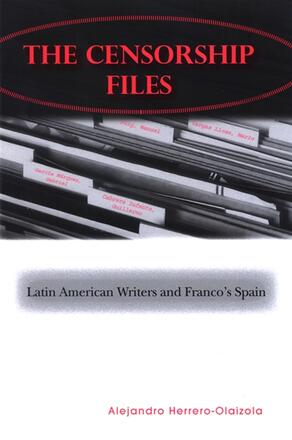
The Censorship Files
Latin American Writers and Franco's Spain
Alternative formats available from:
Investigates the role played by censorship in the Spanish-language publishing industry, which led to the Latin American Boom literature of the 1960s and 1970s.
Description
Drawing on extensive research in the Spanish National Archive, Alejandro Herrero-Olaizola examines the role played by the censorship apparatus of Franco's Spain in bringing about the Latin American literary Boom of the 1960s and 1970s. He reveals the negotiations and behind-the-scenes maneuvering among those involved in the Spanish publishing industry. Converging interests made strange bedfellows of the often left-wing authors and the staid officials appointed to stand guard over Francoist morality and to defend the supposed purity of Castilian Spanish. Between these two uneasily allied groups circulated larger-than-life real-world characters like the Barcelona publisher Carlos Barral and the all-powerful literary agent Carmen Balcells. The author details the fascinating story of how novels by Mario Vargas Llosa, Guillermo Cabrera Infante, Gabriel García Márquez, and Manuel Puig achieved publication in Spain, and in doing so reached a worldwide market. This colorful account underpins a compelling claim that even the most innovative and aesthetically challenging literature has its roots in the economics of the book trade, as well as the institutions of government and the exigencies of everyday politics and ideology.
Alejandro Herrero-Olaizola is Associate Professor of Spanish at the University of Michigan at Ann Arbor and the author of Narrativas híbridas: parodia y posmodernismo en la ficción contemporánea de las Américas.
Reviews
"Herrero-Olaizola has done meticulous archival research that sheds new light on the history of the Boom and the mechanisms through which the field of cultural production and the field of power (to use Bourdieu's terms) interacted during the process of publication and canonization of the movement." — A Contracorriente
"…opens up new avenues for further studies on the Boom writers … appeals to a broader educated readership interested in the subject matter … a brilliant contribution to the study of Latin American Boom writers." — Bulletin of Hispanic Studies
"…Herrero's book provides a pleasurable reading experience, based on admirable archival work, that unearths an important chapter in the history of Latin American literature on the one hand and of Spain's political and economic policies on the other." — Modern Language Notes
"This is … cultural studies at its most brilliant. Not only does Herrero-Olaizola concern himself with the sociohistoric contexts of cultural production and the ways in which censorship and the regime of cultural authoritarianism and cultural superiority in Spain … affect the nature of the literary text … but he also engages in the sort of close textual scrutiny and analysis that reminds us that we are dealing with artistic constructs and not sociological documents." — Hispania
"In this excellent example of the virtues and possibilities of archival research, Herrero-Olaizola offers a fascinating look at the intersection (and dark underside) of literature, publishing, and cultural censorship in relation to the diffusion of the Latin American boom of the 1960s–70s in Spain." — CHOICE
"Herrero-Olaizola's study is groundbreaking. He unearths, quite literally from declassified archives and authors' manuscripts, essential episodes of literary, political, and commercial negotiation as Spain published Latin American writers during the last phase of the Franco regime. I admire his exhaustive and original research, the clarity of his complex arguments, and his seamless interdisciplinary approach (blending literary studies, politics, business, international relations, and gender). This book completes the intellectual history of the Boom." — Marcy E. Schwartz, author of Writing Paris: Urban Topographies of Desire in Contemporary Latin American Fiction
"An original and excellent book based on impressive scholarship." — Daniel Balderston, coeditor of Voice-Overs: Translation and Latin American Literature